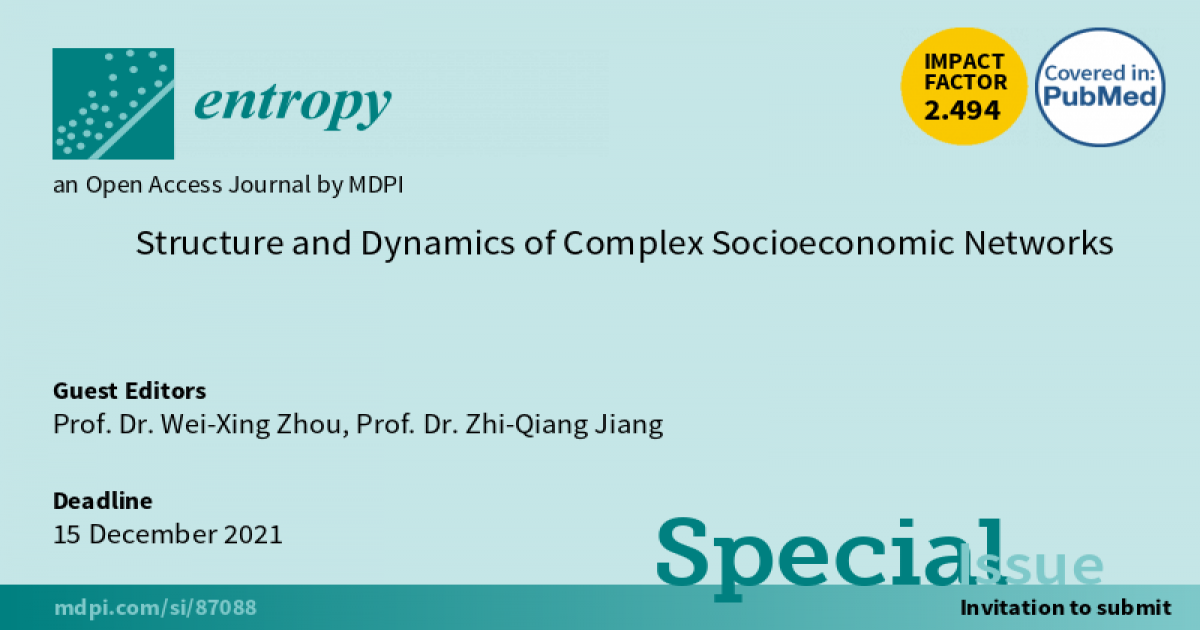Structure and Dynamics of Complex Socioeconomic Networks
A special issue of Entropy (ISSN 1099-4300). This special issue belongs to the section "Complexity".
Deadline for manuscript submissions: closed (15 December 2021) | Viewed by 38553

Special Issue Editors
Interests: econophysics; sociophysics; complex economic networks; complex financial networks; fractal analysis; agent-based modelling; international trade networks
Interests: econophysics; sociophysics; complex economic networks; complex financial networks; fractal analysis; cooperation
Special Issues, Collections and Topics in MDPI journals
Special Issue Information
Dear Colleague,
Complex systems are ubiquitous in nature and human society, and are composed of microscopic units with nonlinear interactions that can be presented as complex networks. In the past decades, with the development of information technology, huge datasets have become available in diverse fields of social and economic activities, and the research on complex socioeconomic networks has flourished, significantly deepening our understanding of socioeconomic behaviors.
The behavior of a complex socioeconomic system is mainly determined by the structure and dynamics of the underlying network. From the viewpoint of econophysics and sociophysics, there is still huge room to investigate complex socioeconomic networks to develop new models and unveil novel or distinct properties, such as the measure, contagion, early warning, and containment of systemic social and economic risks.
This Special Issue aims at collecting theoretical, empirical, computational, and experimental contributions related to complex socioeconomic networks from all fields. Applications of complexity and entropy are particularly welcome. All submissions should concentrate on the structure or dynamics of complex socioeconomic networks. Comprehensive reviews are also welcome.
Prof. Dr. Wei-Xing Zhou
Prof. Dr. Zhi-Qiang Jiang
Guest Editors
Manuscript Submission Information
Manuscripts should be submitted online at www.mdpi.com by registering and logging in to this website. Once you are registered, click here to go to the submission form. Manuscripts can be submitted until the deadline. All submissions that pass pre-check are peer-reviewed. Accepted papers will be published continuously in the journal (as soon as accepted) and will be listed together on the special issue website. Research articles, review articles as well as short communications are invited. For planned papers, a title and short abstract (about 250 words) can be sent to the Editorial Office for assessment.
Submitted manuscripts should not have been published previously, nor be under consideration for publication elsewhere (except conference proceedings papers). All manuscripts are thoroughly refereed through a single-blind peer-review process. A guide for authors and other relevant information for submission of manuscripts is available on the Instructions for Authors page. Entropy is an international peer-reviewed open access monthly journal published by MDPI.
Please visit the Instructions for Authors page before submitting a manuscript. The Article Processing Charge (APC) for publication in this open access journal is 2600 CHF (Swiss Francs). Submitted papers should be well formatted and use good English. Authors may use MDPI's English editing service prior to publication or during author revisions.
Keywords
- complex social networks
- complex economic networks
- complex financial networks
- complexity and entropy
- structure and dynamics
- network robustness
- systemic risks
- network vulnerability
- network modeling
Benefits of Publishing in a Special Issue
- Ease of navigation: Grouping papers by topic helps scholars navigate broad scope journals more efficiently.
- Greater discoverability: Special Issues support the reach and impact of scientific research. Articles in Special Issues are more discoverable and cited more frequently.
- Expansion of research network: Special Issues facilitate connections among authors, fostering scientific collaborations.
- External promotion: Articles in Special Issues are often promoted through the journal's social media, increasing their visibility.
- Reprint: MDPI Books provides the opportunity to republish successful Special Issues in book format, both online and in print.
Further information on MDPI's Special Issue policies can be found here.







